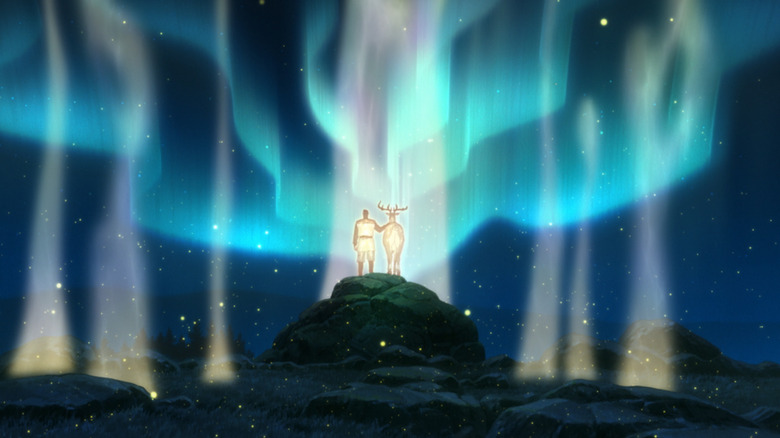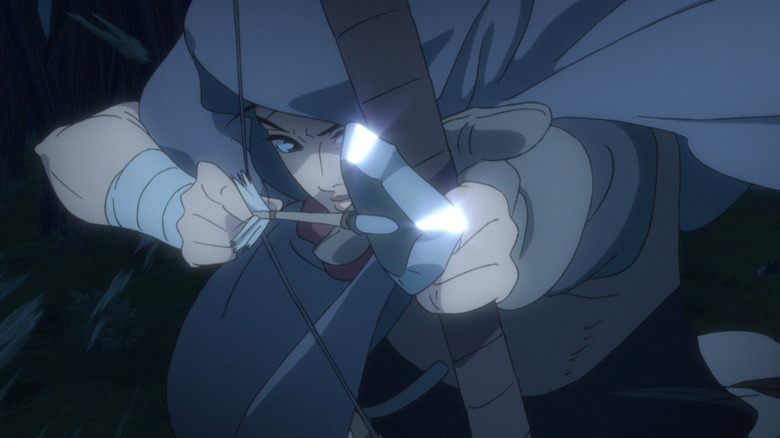The Deer King Review: In The Shadow Of Ghibli
Masashi Ando has worked with some of the foremost filmmakers in the anime industry — Hayao Miyazaki, Satoshi Kon, Makoto Shinkai. He's worked on the animation for some of the greatest anime films of all time — "Spirited Away," "Princess Mononoke," and "Your Name," to name a few. Now after more than three decades in the industry, Ando is stepping out from beneath the shadows of the great anime titans to direct a feature film of his own. But with the visually dazzling, emotionally inert, and narratively confusing "The Deer King," it seems Ando still can't escape that shadow.
Ando co-directs "The Deer King" with Masayuki Miyaji, a fellow Ghibli alum who also worked on "Spirited Away." The duo's shared credentials on the 2001 Oscar winner are a big point of marketing for "The Deer King," whose every trailer has "from the animators behind 'Spirited Away'" splashed on it. And there's a certain shared DNA with the Miyazaki masterpiece, along with Miyazaki's 1997 film "Princess Mononoke": an otherworldly aura; a conflict between the old, natural world and the new, industrial world; cute animals. But those surface-level elements are where the comparisons stop.
"The Deer King" lacks the deep-rooted affection for nature that is built into the very bones of Miyazaki's films — in Ando and Miyaji's adaptation of the Japanese fantasy novel series written by Nahoko Uehashi, there is a disconnect between the film's reverence for the majesty of nature, and ... everything else. Instead, "The Deer King" gets bogged down by a convoluted plot and confusing world-building that even the most majestic of animated sequences (and they are truly gorgeous) can't enliven the film.
Dazzling visuals, a dud of a plot
"The Deer King" is set in a fantasy world torn apart by war. The highly religious empire of Zol has conquered the hardy, earthbound kingdom of Aquafa, but the fragile peace looks like it will be shattered again with the spread of a deadly disease that Zol believes is the doing of the Aquafa people. And they would be right — supernatural dogs controlled by Aquafa rebels are the cause of the "Black Wolf Fever," a gradual poisoning of the entire body that is caused by a bite from one of these dogs. The fact that these dogs avoid the Aquafa people only strengthens the Zol's anger, leading Aquafa people to be further persecuted.
One of these Aquafa people is Van, the last of an elite band of warriors who were all enslaved by the Zol empire. After an attack on a salt mine by a group of these supernatural dogs leaves him and a young girl Yuna the only survivors, Van takes Yuna under his wing. But a bite from one of the dogs has left him with strange abilities — he can turn weapons into branches or trees, and stop a charging boar with just his hand. He finds himself the target of both the Zol empire and the Aquafa rebels — the former believing him the source of the plague's cure, the latter believing him to be the chosen king that will lead them to victory. Oh also, a third group wants him dead, for other nefarious reasons that I couldn't quite figure out. But Van only wants to raise deer-like creatures called "pyuika" with the cheery Yuna and a band of farmers who give him shelter.
That's the plot condensed to its broadest strokes, which is already too dense for a movie that boils down to a man being hunted down for his newfound abilities. Van is your typical turmoiled lone warrior, broken down by the loss of his wife and son, who finds newfound reason to live in Yuna — the film is at its best when it becomes another iteration on the "lone wolf and the cub" story. But when it throws in needlessly complicated politics, "The Deer King" starts to get lost in its murky plot and convoluted narrative — I spent way too much time trying to piece together just who the various Zol and Aquafa factions were, and what they were trying to do.
"The Deer King" is a film that is narratively too beholden to its source material and visually too beholden to the Studio Ghibli films where Ando and Miyaji cut their teeth. While there are some truly jaw-droppingly beautiful visuals that speak to a greater imagination on Ando and Miyaji's part — they were animation directors for several acclaimed projects and have a keen eye for how to make things look good — the soul is missing. "The Deer King" can't help but feel like a paint-by-the-numbers riff on greater films before it.
/Film Rating: 6 out of 10

